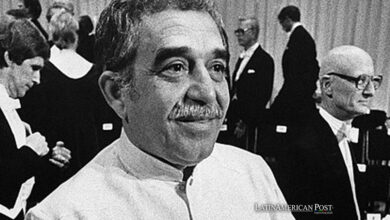Colombia: What Is The Petro Clause?
With the appearance of the 'Petro clause' and the 'Fico clause', Colombians have shown some fear that one of the two candidates will reach the House of Nariño. What do employers think of this situation? .

Photos: TW-petrogustavo, TW-FicoGutierrez
LatinAmerican Post | Christopher Ramírez Hernández
Escucha este artículo
Leer en español: Colombia: ¿Qué son la cláusula Petro y cláusula Fico?
On January 30, the lawyer Ramiro Bejarano brought to the memory of all Colombians a controversy that began in 2018, when the current left-wing candidate for the presidency of Colombia, Gustavo Petro, ran against Ivan Duque.
The columnist also wrote an opinion article that was published in the newspaper El Espectador , in which he put on the table the so-called 'Petro clause'. According to Bejarano, "the dirty strategy of including a stipulation in the large contracts that have been signed has been implemented, by means of which the parties, allegedly exercising their autonomy of will, agree that the contract only it would begin to be executed if Petro is defeated in the presidential elections, or that it be left without effect if he were to become president.”
On the other hand, there is a clause that directly attacks a possible government of Federico Gutiérrez, a right-wing candidate, and which, according to left-wing senator Gustavo Bolívar, could also affect foreign investment in the country. According to Bolívar, the 'Fico clause' (nickname by which Gutiérrez is known), regulates international investment in Colombia, since very few would be interested in placing their trust in this country if the violence continues.
“As long as insecurity continues in Colombia, they cannot invest. One of them (an investor) who has lived for 25 years told me that if 'Fico' won, they would not invest. The ruling party (Centro Democrático that would support Fico) is betting on other situations, it is not aiming for peace but for war,” Bolívar explained in a conversation with the Caracol Radio station.
#ClausulaFico
Colombia es un Mercado de 51 millones de personas. Cientos de empresas extranjeras están listas a invertir cuando tengamos paz. A muchos empresarios extranjeros les da miedo venir a Colombia. Con paz quintuplicamos turismo e inversión.
El uribismo es guerra.— Gustavo Bolívar (@GustavoBolivar) April 12, 2022
If Petro won, the fear of internal negotiation would be very high, according to some lawyers and experts, while a victory for Gutiérrez, as mentioned by Bolívar , would bring a similar crisis but in the negotiations coming from abroad.
“Beyond a government”
However, in the midst of this controversy of governments, politicians, parties and fears, the truth is that one thing is the fear strategies that one or the other side can use in order to sink their opponents, in this case, using the economy as a fort, and a real one that is glimpsed by entrepreneurs and investors, who ultimately have the power to decide whether to generate employment or investment in a country.
This was precisely what Ricardo Triana, executive director of the Council of American Companies (CEA) in Colombia, explained bluntly. That businessmen, in this case, Americans, " invest for the country and not in a government, in a State like such, and we have to celebrate it, because these companies believe in the country regardless of everything”.
The leader of this organization which houses more than 111 North American companies based in Colombia, stressed in his conversation with Portafolio , that the businessmen of that country are believing in Colombia "as an institution", because "even with all the problems and uncertainties that are being generated, they continue to invest in the long term, which for them is 50 years”.
This argument could be supported, in case Gustavo Petro wins, with other countries in which the left is the government, such as Chile. In March 2022, Gabriel Boric took office as president of the southern country, and since then, contrary to what the opposition believed, his relationship with businessmen and investors has been improving.
After his visit to Argentina, where he recalled the strengthening of economic relations with that country, with which Chile has the "largest trade relationship in Latin America, more than 5 billion dollars" invested , Boric has now begun to earn the approval of the main Chilean business associations, with whom he did not have a good relationship at the beginning of his term.
At the beginning of April, Boric announced a new plan with which to have an economic and labor recovery in Chile after the covid-19 pandemic, a strategy that was not alien to unions such as the Society for Manufacturing Development (Sofofa) and the Confederation of Production and Trade (CPC).
"We agree with the plan announced by the government that emphasizes the recovery of the labor market, which (…) has not yet reached the levels prior to the health crisis," said the president of Sofofa, Richard von Appen, through a Press release.
YOU MAY BE INTERESTED: Will Gustavo Petro Be Able To Emulate The European Pension Systems In Colombia?
However, one of the most worrying problems at the moment, not only for Chilean and Colombian businessmen but for the entire region, is the issue of inflation; although this is a problem, which, taking into account what is currently seen in the world, does not only affect the responsibility of local leaders in Latin America.
Situations such as the war in Ukraine are seriously affecting the world economy, taking into account that, according to the International Grain Council , only Russia and Ukraine account for 22% of wheat imports worldwide. In addition, Russia, being one of the biggest exporters of fertilizer (only in 2019 it had a volume of 9 billion dollars), has caused the prices of this material to rise more than 40% in the last two months.
This has caused a food crisis that, of course, also affects Latin America. So, will the fear for Petro or Fico continue in Colombia, even considering the economic reality that affects not only this country but the entire planet?




